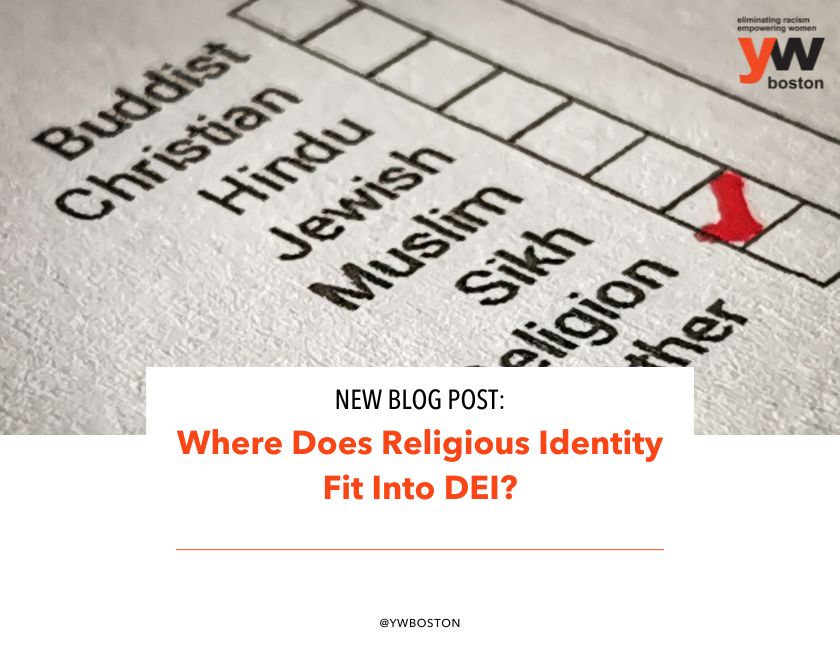
September 14, 2023
By: Ilana Coolidge
Where Does Religious Identity Fit Into DEI?
At YW Boston, when we are discussing social identities and the intersectionality between them, we look at eight types of identity: gender, race, class, religion, ability, citizenship status, age, and sexual orientation. Although religion is one of the determining factors of social identity, it is often excluded from diversity, equity, and inclusion (DEI) work. This is unfortunate, as religious and spiritual beliefs are a critical component of someone’s identity and many religions place high value on community.
One possible reason that religion is a less-explored topic is that historically, the people with power in religion have had privileged identities. Those people in power might not experience religious persecution, but those with marginalized gender and racial identities in that same religion live with that threat. There is also the common “wisdom” that advises against talking about religion or politics at work. This means that someone might feel their religion, which is an important part of their social identity, may not be welcome in their workplace.
The question is, then, how can an inclusive workplace ensure religious identity is not excluded? Does religious identity fit into inclusion? While there is no single, easy answer, there are ways to think about how these two ideas can exist together. Throughout YW Boston’s years working in the Greater Boston Area, it has become clear that defining how religious identity fits into DEI is an ongoing process.
As the first YWCA (Young Women’s Christian Association) in the country, YW Boston’s origins are tied to religious identity. The original founders aimed to ensure “the temporal, moral, and religious welfare of young women.” While YW Boston’s name and mission have shifted away from the religious aspect over the 150 years since its founding, its focus on racial and gender equity evolved from those beginnings.
YW Boston has begun a change management process through with a variety of organizations, including organizations with an explicit religious affiliation. Critical to that work is understanding the impact, for example, of a religious title or company name and the perception of what that organization values. In YW Boston’s workshop on Understanding Social Identity, participants appreciate that your identity is not only what you perceive about yourself, but is co-constructed with how others perceive you. Power lies in the ability to understand where your perception of yourself does or doesn’t align with others’ perception of you.
When a Jewish federation engaged in deep identity work during their InclusionBoston process, their cohort discussed how non-Jewish staff may feel excluded from workplace culture even though they were committed to the mission of the organization. When a large human services organization began workshops on Identity, Implicit Bias, and Equity-led Visioning, their leadership grappled with the overlapping needs of their organizational mission, vision, and brand. During Village Bank’s InclusionBoston process, their staff questioned which holidays are normalized as universal vacation days, and which religious holidays must be specially requested for paid time off.
There is an important distinction between religious identity and cultural identity. They might overlap, but they are not the same thing. While religion can be a part of one’s cultural identity, it is not the only defining factor. Cultural identity encompasses the shared customs and traditions of a group of people.
If we define community as a homogenous group, all sharing the same social identities, we are not only creating an unrealistic ideal, but a harmful one. Community is not meant to only refer to groups of people like ourselves. True community is made up of individuals with differing social identities. While some may overlap, it is the differences that make a community vibrant and unique. Even if two employees share the same religious identity, they may celebrate these identities very differently. It takes work to support an inclusive environment, where everyone feels able to show up with their specific religious or spiritual identities.
With the upcoming Jewish High Holidays (Rosh Hashanah and Yom Kippur, the Jewish New Year and Day of Atonement), organizations may be thinking about how Jewish values fit into the broader topic of inclusion. In Judaism, community plays an integral role. There are several commandments that can only be fulfilled when in a group, including certain prayers.
There is another Jewish value that is worth noting when discussing community: Tikkun Olam. Roughly translated to “repairing the world,” the concept encompasses community service, social justice, environmental work, and anything in pursuit of a better shared world. This value extends beyond the Jewish community, with the goal of improving the world not just for people who identity as Jewish, but for everyone.
This is reflected in how YW Boston does its inclusion work. It takes action and hard work to build inclusive communities. As sociologist Ruha Benjamin writes, “Remember to imagine and craft the worlds you cannot live without, just as you dismantle the ones you cannot live within.” Through programs like InclusionBoston, YW Boston aims to help organizations accomplish both of these goals.
Thanks to Anouska Bhattacharyya (YW Boston VP of Programs) for additional input.
About InclusionBoston
InclusionBoston engages organizations in long-term partnerships to create unique solutions to a variety of diversity, equity, and inclusion challenges. Using a customized and measurable change management process and range of training and services, InclusionBoston helps organizations create the necessary cultural shift that will support inclusive policies and practices. Our evidence-based approach builds internal capacity and a plan for cultural change while supporting organizations every step of the way. We deliver our services in person, remotely, or as a combination tailored to our partners’ specific needs.
YW Boston can help you develop a strategy that tackles issues that are important to your employees. Learn more here.

